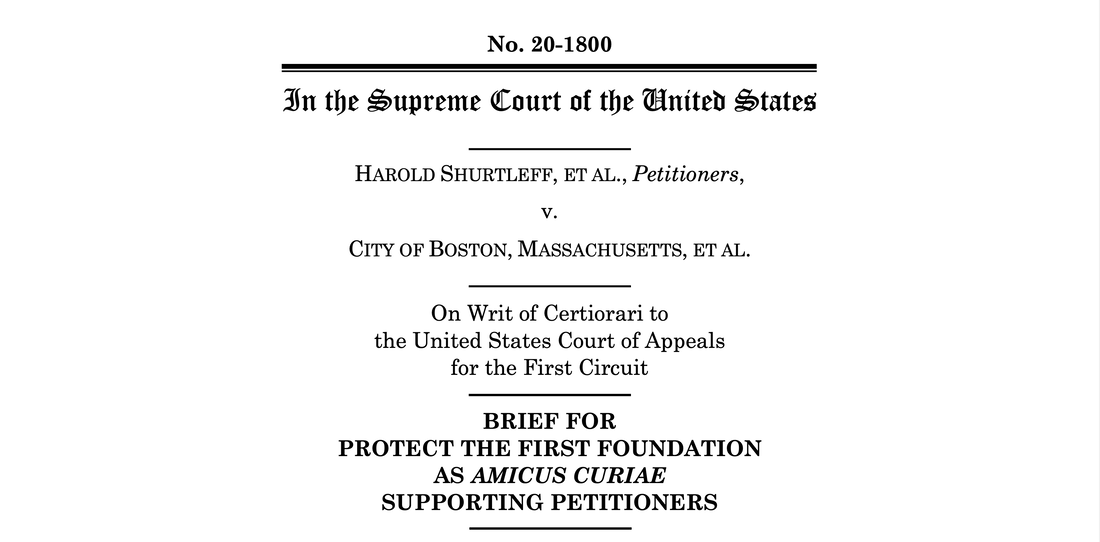|
When the U.S. Supreme Court hears oral arguments in Shurtleff v. City of Boston on Jan. 18, 2022, it will examine a case in which Boston city officials allowed hundreds of groups that applied to fly a flag on a city flagpole to do so – with one exception.
Boston had designated a flagpole near City Hall Plaza to be available for private persons and groups for events. From 2005 to 2017, Boston allowed 284 flag raising events, from a gay pride flag to a Bunker Hill Flag, with no prior review of their messages. No applications were rejected. Then came Camp Constitution, a group whose mission is to “enhance understanding of the country’s Judeo-Christian heritage, the American heritage of courage and ingenuity, the genius of the United States Constitution, and free enterprise.” The group wanted to host an event celebrating the ”historical civic and social contributions of the Christian community to the City of Boston, the Commonwealth of Massachusetts, religious tolerance, the Rule of Law, and the U.S. Constitution,” by hosting an event at Boston’s City Hall Plaza that would raise “the Christian Flag,” which displays a red Latin cross. But the Boston city government refused to grant permission, claiming it had a policy of not allowing religious flags to be raised on city-owned flag poles—even though many of the flags raised previously, including Boston’s own flag, display religious words or imagery. Harold Shurtleff and other members of his Camp Constitution group sued. The U.S. Court of Appeals for the First Circuit upheld the city’s decision, holding that when private groups and individuals raised flags on City Hall Plaza, it was Boston, not those groups or individuals, that did the speaking. That meant, in the First Circuit’s eyes, that Camp Constitution’s request wasn’t protected by the First Amendment. In an amicus brief filed in support of Shurtleff and Camp Constitution, Protect the First Foundation demonstrates that: “By reducing the amount of protection speech receives as governmental regulation of that speech increases, the courts have turned the First Amendment on its head.” Protect The 1st shows that the First Circuit Court erred in defining the flagpole as “government speech.” If that ruling is correct, then the court is forcing the Boston taxpayers to endorse all the messages contained in the 284 flags that were flown. It is easy to see how obnoxious that doctrine would be in a free society: If in 2020 the White House had hoisted a flag proclaiming “Trump 2020—Keep America Great,” it would have been clear that the government was using taxpayer-funded property to express a political message. Likewise, the Commonwealth of Virginia surely could not use state funds to erect a giant billboard reading, “Virginia Says Keep Our State Blue!” Such efforts have the self-evident goal of using the compelled funding and machinery of the State to manipulate public opinion. Protect The 1st’ Foundation quoted Thomas Jefferson, who wrote that “to compel a man to furnish contributions of money for the propagation of opinions which he disbelieves and abhor[s] is sinful and tyrannical.” If the First Circuit is correct, then Boston is forcing taxpayers to pay for government speech that they may or may not agree with. In fact, as the brief asserts, the City of Boston was merely allowing private speech on a public venue. “If private speech could be passed off as government speech by simply affixing a government seal of approval, government could silence or muffle the expression of disfavored viewpoints.” And because the flag raisings are not government speech, Boston can’t choose to exclude disfavored viewpoints—including religious viewpoints. But that’s exactly what Boston did, which is why the Supreme Court should reverse the First Circuit. Comments are closed.
|
Archives
June 2024
Categories
All
|
ABOUT |
ISSUES |
TAKE ACTION |



 RSS Feed
RSS Feed